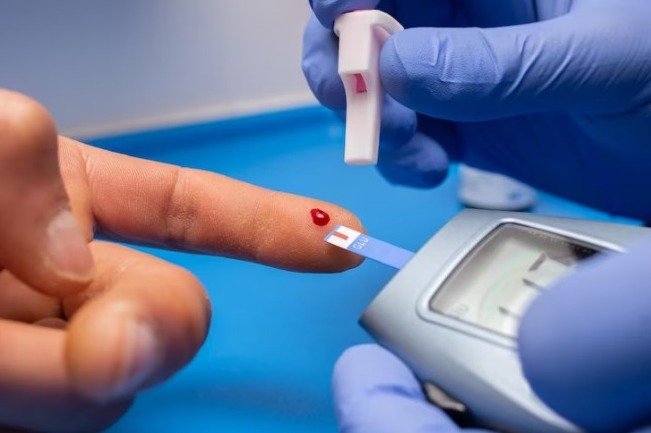Without the Need to Boil First, Here's a Simple Way to Make Fried Vermicelli Last Longer and Not Sticky
Bihun, a food ingredient with a chewy texture made from rice or wheat flour, is a popular choice for many people.

Kapanlagi.com - In maintaining health, managing blood sugar levels is highly emphasized, especially for individuals with diabetes. Although medications can provide assistance, it is also important to consider a healthy lifestyle as an integral part of blood sugar management. One approach that can be taken is to reduce dependence on medication and replace it with positive changes in lifestyle.
Changes in lifestyle that focus on specific aspects can have a significant impact on blood sugar levels. Consuming foods with a low glycemic index, exercising regularly, and managing stress can be important foundations for achieving optimal blood sugar control. By understanding the relationship between a healthy lifestyle and blood sugar management, one can design strategies according to their health needs.
Let's find out more information, quoted from various sources on Thursday (11/01/2024).

Illustration of Jogging (Source: Freepik)
Based on information from the Semarang City Health Office, physical activity can increase cell response to insulin, which ultimately can lower blood sugar levels and help control diabetes symptoms gradually.
Light exercises such as jogging have been proven effective. By involving overall leg and arm movements, the body will burn calories. Michelle May MD, author of the book Eat What You Love, notes that exercising for 45 minutes can reduce blood sugar levels by up to 155 mg/dL. By regularly engaging in this activity, you can improve blood sugar management more efficiently.

Illustration of Healthy Eating Patterns (Source: Freepik)
According to information from alodokter.com, consuming fiber-rich foods such as fruits and vegetables can help lower blood sugar levels. In addition, whole grains also provide benefits to meet daily nutritional needs. It is recommended that fiber intake reaches 25-32 grams for women and 30-35 grams for men to support optimal health.
In an effort to control blood sugar, it is recommended to limit sugar consumption to a maximum of 24 grams or about 6 teaspoons per day. By adhering to this guideline, you can effectively maintain blood sugar balance.

Diet (Source: Freepik/Kamran Aydinov)
The presence of excess weight can increase the risk of diabetes due to the accumulation of fat within muscle cells, which can hinder the absorption of blood sugar. According to the DPP study, losing about 5-7 percent of body weight (approximately 4.5-6.8 kilograms for individuals weighing 90 kilograms) can reduce the risk of diabetes.
As a solution, it is recommended to limit daily food intake with smaller portions and use special recipes with lighter flavors. For example, replacing breakfast with whole wheat bread, choosing lunch with smaller portions of rice and low-calorie dishes, and ending the day by consuming fruits during dinner. By following these steps, weight control can be improved, thus significantly reducing the risk of diabetes.

Illustration of Blood Sugar Test (Source: Freepik/wirestock)
Based on information from Redcliffe Labs medically reviewed by Dr. Ragiinii Sharma, monitoring blood sugar levels plays a crucial role in diabetes management, especially for those who require insulin.
The focus of diabetes management is on controlling blood sugar levels within the established range. By regularly monitoring, a person can track their blood glucose levels and understand how diet, physical activity, medication, and other factors affect diabetes control.

Illustration of Rest to Relieve Stress (Source: Freepik)
Based on information from alodokter.com, long-term stress can affect an increase in blood sugar levels because the cortisol hormone produced by the body during stressful situations can affect insulin function.
Therefore, it is recommended to manage stress as an effort to maintain stable blood sugar levels. You can engage in enjoyable activities such as reading, painting, watching movies, or listening to music.
Practicing relaxation techniques and scheduling rest time can also provide assistance, with 7-9 hours of sleep each day to reduce stress levels. By implementing these steps, you can maintain blood sugar balance and improve overall quality of life.
Quoted from halodoc reviewed by dr. Rizal Fadli, several types of diabetes medication are recommended to help reduce blood sugar levels. Such as Metformin 500 mg, Gliquidone 30 mg, Glibenclamide 5 mg, and Jardiance 10 mg.
Moringa leaves contain chlorogenic acid which has been proven to provide benefits in regulating blood sugar levels, as well as assisting in the process of glucose uptake and release by cells according to the body's needs.
Bay leaves are often used as a food seasoning because of their distinctive aroma. However, bay leaves also have benefits in lowering cholesterol and blood sugar levels.
According to information from Siloam Hospitals, various types of food and drinks that can trigger diabetes need to be limited in consumption. This includes high-carbohydrate foods, packaged snacks, dried fruits, fatty foods, alcoholic beverages, and processed meats.
Berries are rich in antioxidants, vitamins, and fiber that are beneficial for controlling blood sugar levels. Berries such as strawberries and blueberries are recommended for individuals with diabetes.
(kpl/saa)
Cobain For You Page (FYP) Yang kamu suka ada di sini,
lihat isinya
Bihun, a food ingredient with a chewy texture made from rice or wheat flour, is a popular choice for many people.
The great benefits of this safe method can be felt by those who experience stomach problems after enjoying coffee. With this method, they can enjoy the taste of coffee without sacrificing their stomach health.
Erick Thohir is a businessman who currently serves as the Minister of State-Owned Enterprises and owns shares in an English football club named Oxford United
Eden Hazard, officially retired from the world of football at the age of 32.
Dita Karang is a member of the Korean girl group Secret Number from Yogyakarta.
Samuel Zylgwyn and Franda are building their dream house in Bali.
Kimberly Angela, the actress of Magic 5 whose charm captivates the hearts of men.
Here is a series of portraits and profile reviews of a handsome actor named Dimas Anggara.
Here is a series of pictures of the touching moment of Nana Mirdad separating from the baby found in the bushes.
Mikhayla eagerly runs to meet Baby Zica, Nia Ramadhani's personal assistant's child, when she comes home from school
Samuel Zylgwyn and Franda decided to move to Bali and are currently in the process of building their dream house
Grace Natalie is a politician who was once the best news presenter in 2008